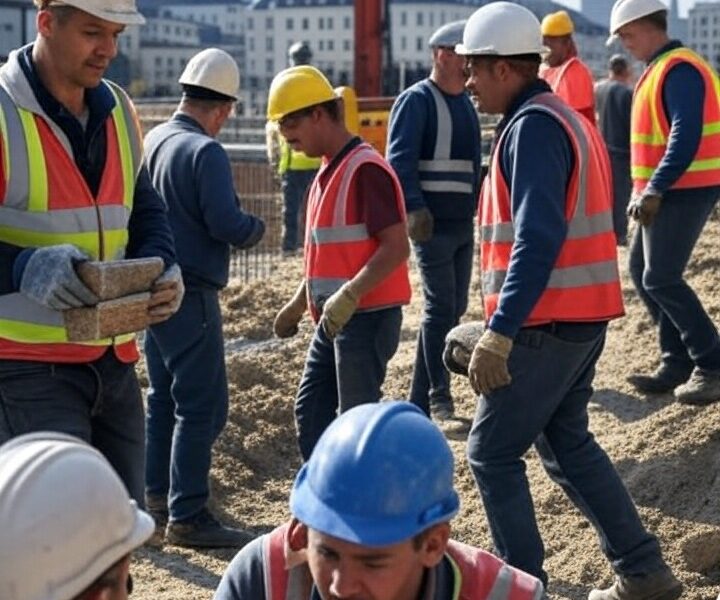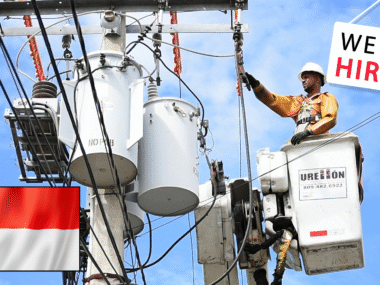Learn how to secure construction jobs in Norway for foreigners with visa sponsorship, including requirements, job search tips, and application steps.
Introduction
Norway, known for its robust economy, high quality of life, and strong workers’ rights, is an attractive destination for foreigners seeking employment opportunities in the construction sector. With ongoing infrastructure projects, residential developments, and a demand for skilled tradespeople, the Norwegian construction industry offers promising prospects for international workers.
However, securing a construction job in Norway as a foreigner requires navigating specific visa requirements, understanding the job market, and leveraging the right resources. This comprehensive guide outlines the steps to obtain construction jobs in Norway with visa sponsorship and ensuring compliance with Norwegian immigration laws.
Understanding the Norwegian Construction Job Market
Norway’s construction industry is thriving due to continuous investments in infrastructure, housing, and commercial projects. The country faces persistent skill shortages, particularly for roles such as carpenters, electricians, plumbers, bricklayers, and heavy machinery operators.
According to recent data, a development laborer in Norway earns approximately NOK 270 per hour, translating to an annual salary of around NOK 560,836, while development specialists may earn between NOK 410,532 and NOK 668,517 annually. These competitive salaries, coupled with Norway’s emphasis on worker safety and fair compensation, make it an appealing destination for skilled construction workers.
Foreigners, especially non-EU/EEA nationals, must secure a job offer with visa sponsorship to work legally in Norway. Employers often prefer candidates with relevant skills, certifications, and experience, as the Norwegian job market prioritizes local talent. However, the shortage of skilled workers creates opportunities for qualified foreigners, provided they meet immigration and employment criteria.
Related Post:
- How to Get Construction Jobs in Singapore for Foreigners with Visa Sponsorship
- How to Get a Marriage Visa in Norway for Foreigners
Visa Sponsorship and Work Permit Requirements
To work in Norway’s construction industry as a non-EU/EEA national, you need a residence permit, which typically includes a work visa. The Norwegian Directorate of Immigration (UDI) oversees the visa application process. Below are the key requirements for obtaining a skilled worker residence permit with visa sponsorship:
1. Secure a Concrete Job Offer
-
You must have a formal, full-time job offer from a specific Norwegian employer (at least 80% of a full-time position is acceptable).
-
The job offer must detail the role, responsibilities, and salary, which should align with Norwegian industry standards.
-
The employer must be willing to sponsor your visa, which may involve assisting with the application process or applying on your behalf.
2. Relevant Qualifications and Skills
-
A completed vocational training program of at least three years at the upper secondary school level, equivalent to Norwegian standards, is required. Alternatively, a degree or substantial professional experience combined with relevant courses may suffice.
-
For construction roles, certifications in trades such as carpentry, plumbing, or electrical work are highly valued. If your qualifications are from countries like Bangladesh, China, India, Iran, Kosovo, Nepal, Pakistan, Türkiye, or Vietnam, additional scrutiny may apply due to concerns about fraudulent documentation.
3. Language Proficiency
-
While Norwegian language skills are not mandatory for all construction jobs, proficiency in English is often required, as it is widely spoken in professional settings.
-
Learning basic Norwegian can significantly enhance your employability and integration into the workplace.
4. Application Process
-
Submit your visa application through the Norwegian embassy or consulate in your home country or via the UDI’s online portal.
-
Required documents include proof of employment, educational qualifications, a valid passport, and a criminal background check.
-
The visa application fee for a skilled worker permit is approximately NOK 6,300 (around USD 690 as of April 2024).
-
Processing times may be longer during peak periods, such as summer, due to reduced staff availability at the UDI.
5. Post-Arrival Requirements
-
Upon arrival in Norway, register with the local police within seven days to formalize your residence status and obtain a Norwegian identification number (D-number or personal number).
-
This number is essential for accessing services like banking, healthcare, and tax registration.
Steps to Find Construction Jobs with Visa Sponsorship
Securing a construction job in Norway with visa sponsorship involves strategic planning and leveraging the right platforms. Here’s a step-by-step guide:
1. Research High-Demand Construction Roles
-
Focus on in-demand trades such as carpentry, electrical work, plumbing, bricklaying, and heavy machinery operation.
-
Stay updated on Norway’s skill shortage lists, available through resources like NAV (Norwegian Labour and Welfare Administration) or industry reports.
2. Tailor Your Resume to Norwegian Standards
-
Create a concise, one- or two-page CV highlighting your most relevant qualifications, work experience, and certifications.
-
Include personal details such as name, address, email, phone number, date of birth, marital status, and language skills.
-
Emphasize any training or certifications relevant to construction, such as safety training or equipment operation licenses.
3. Utilize Job Search Platforms
-
NAV.no: Norway’s official labor and welfare portal offers a comprehensive job database. Although primarily in Norwegian, you can search for English-language job postings by filtering with the keyword “English.”
-
Finn.no: A leading job board in Norway with legitimate postings for construction roles.
-
Jobbnorge.no: Lists a variety of job opportunities, including those open to foreigners.
-
EURES: The European Employment Services portal connects job seekers with employers across Europe, including Norway.
-
Indeed.com: Features job listings with visa sponsorship options, such as those from companies like Adecco or Manpower.
4. Work with Recruitment Agencies
-
Recruitment agencies specializing in hiring international workers can streamline the job search process. Notable agencies include:
-
Manpower Norway: Places candidates in construction, IT, and other sectors, offering visa sponsorship for shortage roles.
-
Adecco Norway: Specializes in recruiting for construction, engineering, and technical roles.
-
Randstad Norway: Focuses on engineering and construction positions, connecting global talent with Norwegian employers.
-
Top Temp: Assists with temporary and permanent staffing in construction and other industries.
-
-
Contact agencies directly via their websites, create profiles, and attach your resume to increase visibility to recruiters.
5. Network and Build Connections
-
Networking is critical in Norway, as many jobs are filled through word-of-mouth or personal connections.
-
Join online communities like InterNations or LinkedIn groups focused on Norwegian construction or expat networks.
-
Attend industry events, trade meetings, or job fairs in Norway or virtually to connect with employers and recruiters.
6. Prepare for Interviews
-
Recruitment agencies may conduct initial screenings virtually or arrange interviews with potential employers.
-
Highlight your technical skills, adaptability, and willingness to integrate into Norwegian work culture.
-
Be prepared to discuss your qualifications, experience with tools (e.g., drills, pneumatic hammers), and ability to read blueprints.
7. Secure a Job Offer and Apply for a Visa
-
Once you receive a job offer, work with your employer or recruitment agency to gather the necessary documentation for your visa application.
-
Ensure all paperwork is accurate to avoid delays in processing.
Challenges and Tips for Success
Challenges
-
Preference for Local Talent: Norwegian employers often prioritize locals or EU/EEA nationals, making it essential to demonstrate unique skills or certifications.
-
Documentation Scrutiny: Qualifications from certain countries may face additional verification, requiring patience and thorough preparation.
-
Language Barrier: While English is sufficient for many roles, learning Norwegian can set you apart and improve workplace integration.
-
High Cost of Living: Norway’s high living costs require careful financial planning, though competitive salaries help offset this.
Tips for Success
-
Learn Basic Norwegian: Enroll in language classes or use online resources to learn basic phrases, which can enhance your employability.
-
Obtain Recognized Certifications: Contact the Norwegian Agency for Quality Assurance in Education (NOKUT) to have your foreign qualifications recognized.
-
Stay Persistent: The job search process can be competitive, so apply to multiple roles and follow up with recruiters.
-
Leverage Relocation Support: Some employers or agencies, like Onboard Norway, offer relocation assistance, including help with housing and settling in.
Benefits of Working in Norway’s Construction Industry
-
Competitive Salaries and Benefits: Construction workers enjoy fair pay, health insurance, parental leave, and pension contributions.
-
High Quality of Life: Norway ranks highly for its healthcare, education, and recreational opportunities.
-
Workers’ Rights: Strong labor laws ensure safe working conditions and fair treatment.
-
Path to Permanent Residency: After meeting certain criteria, such as continuous employment, you may be eligible for permanent residency.






